|
|
 Born: 100, in Palestine.
Born: 100, in Palestine.Beheaded: 165, Rome, Italy. Pagan philosopher who converted at age 30 by reading the Scriptures and witnessing the heroism and faith of martyrs. Used his philosophical and oratorical skills to dispute with pagans and explain the faith, becoming one of the first great Christian apologists. He opened a school of public debate in Rome, Italy. All this naturally brought him to the attention of the authorities, and he died a martyr. "O God, who through the folly of the Cross wondrously taught Saint Justin the Martyr the surpassing knowledge of Jesus Christ, grant us, through his intercession, that, having rejected deception and error, we may become steadfast in the faith. Through our Lord Jesus Christ, your Son, who lives and reigns with you in the unity of the Holy Spirit, one God, for ever and ever. Amen." St. Justin Martyr, pray for us! 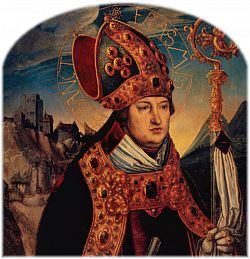 Martyred, 303.
Martyred, 303.Bishop of Formia, Campagna, Italy. He fled to Mount Lebanon in the persecutions of emperor Diocletian where he was fed by a raven so he could stay in hiding. Discovered by the authorities, he was imprisoned, but an angel rescued him. Recaptured, he was martyred. One of the Fourteen Holy Helpers. St. Erasmus may have become the patron of sailors because he is said to have continued preaching even after a thunderbolt struck the ground beside him. This prompted sailors, who were in danger from sudden storms and lightning, to claim his prayers. St. Elmo's fire is named after St. Erasmus (also called St. Elmo). St. Elmo's fire is a weather phenomenon which sometimes appeared on ships at sea during thunderstorms and was regarded by sailors with religious awe for its glowing ball of light. They considered St. Elmo's fire as a sign of the presence of their patron saint. Prayer: St. Erasmus, our life is like a rough sea. We are threatened by tempests of unbelief, by the waves of selfishness, by the whirls of fear, by the darkness of being without hope. Lead the nave of our life safely to the other side, to an eternal life. Amen. St. Erasmus, pray for us! 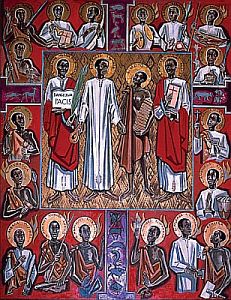 On June 3, 1886, thirty-two young men, pages of the court of King Mwanga of Buganda, were burned to death at Namugongo for their refusal to renounce Christianity. In the following months many other Christians throughout the country died by spear or fire for their faith.
On June 3, 1886, thirty-two young men, pages of the court of King Mwanga of Buganda, were burned to death at Namugongo for their refusal to renounce Christianity. In the following months many other Christians throughout the country died by spear or fire for their faith.These martyrdoms totally changed the dynamic of Christian growth in Uganda. Introduced by a handful of Anglican and Roman missionaries after 1877, the Christian faith had been preached only to the immediate members of the court, by order of King Mutesa. His successor, Mwanga, became increasingly angry as he realized that the first converts put loyalty to Christ above the traditional loyalty to the king. Martyrdoms began in 1885. Mwanga first forbade anyone to go near a Christian mission on pain of death, but finding himself unable to cool the ardor of the converts, resolved to wipe out Christianity. The African martyrs add another page to the Church's roll of honor - an occasion both of mourning and of joy. These African martyrs herald the dawn of a new age. If only the mind of man might be directed not toward persecutions and religious conflicts but toward a rebirth of Christianity and civilization! Africa has been washed by the blood of these latest martyrs, and first of this new age (and, God willing, let them be the last, although such a holocaust is precious indeed). Africa is reborn free and independent. - from the homily at the canonization of Saint Charles Lwanga and companions by Pope Paul VI Prayer O God, by whose providence the blood of the martyrs is the seed of the Church: Grant that we who remember before you the blessed martyrs of Uganda, may, like them, be steadfast in our faith in Jesus Christ, to whom they gave obedience, even unto death, and by their sacrifice brought forth a plentiful harvest; through Jesus Christ our Lord, who lives and reigns with you and the Holy Spirit, one God, for ever and ever. Amen. 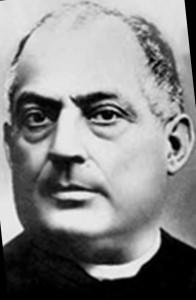 Italian. 1848-1923
Italian. 1848-1923St. Filippo Smaldone founded the Salesian Sisters of the Sacred Hearts and is known for his work with the deaf. He was born in Naples and was ordained a priest in 1871. During his time in the seminary, he began efforts to help the deaf of his native city. He also did work with the sick and nearly died of a plague. He credited his survival to Our Lady of Pompeii. In 1885 he founded an institution for the deaf at Lecce. He went on to work with the blind as well and also orphans. St. Filippo died at 75 from diabetes related complications. He was beatified in 1996 by Pope John Paul II and canonized in 2006 by Pope Benedict XVI. "St. Filippo Smaldone, son of South Italy, knew how to instill in his life the higher virtues characteristic of his land. A priest with a great heart, nourished continuously on prayer and Eucharistic adoration, he was above all a witness and servant of charity, which he manifested in an eminent way through service to the poor, in particular to the deaf, to whom he dedicated himself entirely. The work that he began developed thanks to the Congregation of the Salesian Sisters of the Sacred Hearts founded by him and which spread to various parts of Italy and the world. Saint Filippo Smaldone saw the image of God reflected in the deaf, and he used to repeat that, just as we prostrate before the Blessed Sacrament, so we should kneel before a deaf person. From his example we welcome the invitation to consider the ever indivisible love for the Eucharist and love for one's neighbor. But the true capacity to love the brethren can come only from meeting with the Lord in the Sacrament of the Eucharist." - Pope Benedict XVI, from the canonization homily of St. Filippo St. Filippo Smaldone, pray for us! 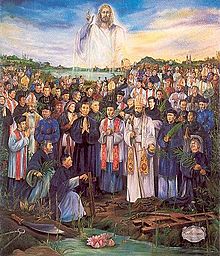 Vietnamese. Martyred in 1840 at the age of 84.
Vietnamese. Martyred in 1840 at the age of 84.Canonized By: Pope John Paul II Martyr of Vietnam. A native of Vietnam. Luke was ordained a priest and then served the Catholic community until his arrest by anti-Christian forces. He was beheaded on June 5, 1840. His canonization took place in 1988 along with many other Vietnamese martyrs. St. Luke Loan, pray for us. 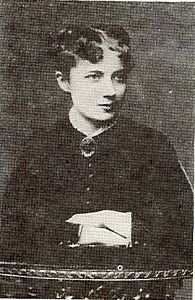 Polish. 1865-1935
Polish. 1865-1935Beatified by Pope John Paul II in 1997. Maria was raised in a pious family and had a great devotion to the Sacred Heart. She founded the Congregation of the Good Shepherd of the Divine Providence (Good Shepherd Sisters), who work for the moral and social rehabilitation of prostitutes and care for those suffering from venereal diseases. "She worked as a true Samaritan among women suffering great material and moral deprivation. Her devotion to the Savior's Sacred Heart bore fruit in a great love for people. Thanks to this love, she restored many souls to the light of Christ and helped them to retain their lost dignity." --Pope John Paul II during the beatification ceremony "Make Christ more visible than we ourselves." --Blessed Maria  Prayer to the Sacred Heart of Jesus
Prayer to the Sacred Heart of JesusO LORD JESUS CHRIST, To your most Sacred Heart, I confide this intention (mention your request) Only look upon me, and then do What your Sacred Heart inspires. Let your Sacred Heart decide I count on it, I trust in it I throw myself on Your mercy, Lord Jesus! You will not fail me. Sacred Heart of Jesus, I trust in You. Sacred Heart of Jesus, I believe in Your love for me. Sacred Heart of Jesus, Your Kingdom come. O Sacred Heart of Jesus, I have asked you for many favors, But I earnestly implore this one. Take it. Place it in Your open, broken Heart; And, when the Eternal Father looks upon It, Covered with Your Precious Blood, He will not refuse it. It will be no longer my prayer, But Yours, O Jesus. O Sacred Heart of Jesus, I place all my trust in You. Let me not be disappointed. Amen. 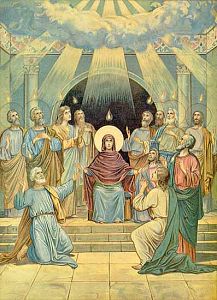 Veni Sancte Spiritus
Veni Sancte SpiritusCome, Holy Spirit, send forth the heavenly radiance of your light. Come, father of the poor, come giver of gifts, come, light of the heart. Greatest comforter, sweet guest of the soul, sweet consolation. In labor, rest, in heat, temperance, in tears, solace. O most blessed light, fill the inmost heart of your faithful. Without your grace, there is nothing in us, nothing that is not harmful. Cleanse that which is unclean, water that which is dry, heal that which is wounded. Bend that which is inflexible, fire that which is chilled, correct what goes astray. Give to your faithful, those who trust in you, the sevenfold gifts. Grant the reward of virtue, grant the deliverance of salvation, grant eternal joy.  Italian. 1769-1837
Italian. 1769-1837Born at Siena, daughter of a druggist named Giannetti, whose business failed, she was brought to Rome and worked for a time as a domestic servant. In 1790 she married Dominic Taigi, a butler of the Chigi family in Rome, and lived the normal life of a married woman of the working class. In the discharge of these humble duties and in the bringing up of her seven children, she attained a high degree of holiness. Endowed with many charismatic gifts, including prophecy, she had the word of knowledge and described future events. Her home was frequented by cardinals and other dignitaries who sought her counsel. She was beatified in 1920. Prayer to the Blessed Mother.... Prostrate at thy feet, O great Queen of Heaven, we venerate you with the deepest reverence and we confess that you are the Daughter of the Father, the Mother of the Divine Word, the Spouse of the Holy Spirit. You are the storekeeper and the distributor of the Divine Mercies. For this reason, we call you Mother of Divine Compassion. Behold us here in affliction and anguish! Show us your true love. We beg you to ask the Holy Trinity, most fervently, to grant us the grace to conquer the devil and the world, and our evil passions; the efficacious grace that sanctifies the just, converts sinners, destroys heresies, enlightens infidels and brings all people to the true Faith. Obtain for us this great gift that all the world may form but one people united in the One True Church. Mary, Mother of Holy Hope, pray for us!  Belgian. 1890 - 1924
Belgian. 1890 - 1924Blessed Edward Poppe is a contemporary saint. He died at the young age of 33. He was one of 11 children born to a modest, pious family in Belgium. One of his brothers had become a priest, and five of his sisters became nuns. His father had died when he was 16 years old and Edward thought he should take on the family business. But he felt a call to the priesthood and entered the seminary on his mother's insistence. He was drafted to the military in 1910 and served as a battlefield nurse during World War I. His prayers to St. Joseph during that time led to the miraculous freeing of several prisoners of war. He was finally ordained in 1916 at the age of 25 and served as associate pastor, focusing his ministry to the poor, children and the dying. He also taught catechism and founded Eucharistic associations. Always a man with a weak constitution, he was transferred to rural Belgium. In 1919, he suffered a heart attack. During his convalescence, he spent most of his time studying, praying and producing thousands of writings against Marxism and secularization. He also developed a devotion to St. Therese of Lisieux and adopted her spirituality. He had another heart attack in January 1924, and died of a stroke only six months later. He was beatified by Pope John Paul II in 1999. "According to the divine plan, action must be fed with prayer. The interior life is the wellspring of the apostolate. Do not believe in the slogan, 'The priest is sanctified in sanctifying others' - it's an illusion. The real formula is, 'Sanctify yourself so as to sanctify others.'" --Blessed Edward Poppe 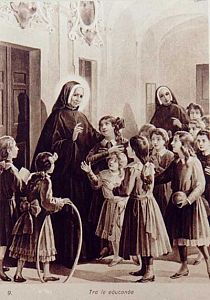 Italian. 1809-1882
Italian. 1809-1882Paula (also know as Paola) was born in Genoa. Her brother was a parish priest in the city, and she assisted him by teaching poor children in their parish. From this humble beginning in 1835 Paula and 6 other women joined the new Congregation of St. Dorothy, which soon spread across Italy and then to the Americas to serve the poorest and most needy youth. Beatified in 1930, she was canonized in 1984, by Pope John Paul II. Paula advised one young Sister: "You must be a visible guardian angel to your children but a quick-eyed angel, alive to all their needs. Watch over them with vigilance and prudence, but let them feel you trust them." Paula was especially sensitive to disfigured children, whom she called "pictures of God without a frame." St. Paula Frasinetti, pray for us!  Born: 1777, Verona Italy.
Born: 1777, Verona Italy.Died: 1853 Bertoni commenced his studies for the priesthood in 1796. In June 1796, around the time of the French Revolution, troops from France began a two decade occupation of the northern Italian cities. Bertoni joined the Gospel Fraternity for Hospitals and worked to help those wounded and ill while also focusing on those who were displaced or otherwise harmed due to the effects of the occupation. He was ordained as a priest on 20 September 1800. Bertoni served as the chaplain to the Daughters of Charity, founded by Magdalene of Canossa, while also serving as the spiritual director of the seminary. He was also one of the leaders to offer prayers and support for Pope Pius VII when he was imprisoned by Napoleon Bonaparte. His pastoral work was marked with the establishment of the Marian Oratories and the devotion to the Five Wounds of Christ. He also established schools for the poor. He founded the Congregation of the Sacred Stigmata of Our Lord Jesus Christ (the Stigmatines) in November 1816. The first written Constitution for the Congregation was based on the Constitutions of St. Ignatius Loyola, founder of the Society of Jesus. As of 2012 there were reported to be 94 houses with 422 members including 331 priests. Prayer... Father, you inspired your Servant and Priest, Gaspar Bertoni, to dedicate himself to the service of the Church, living and preaching the sufferings of Christ. Grant that, following his example, we may be faithful workers in your vineyard and heralds of your word. We ask this through our Lord Jesus Christ, your son, who lives and reigns with you and the Holy Spirit, one God, forever and ever. Amen. St. Gaspar, pray for us!  Born: 1195 in Lisbon, Portugal
Born: 1195 in Lisbon, PortugalDied: 1231, of natural causes Few saints are as loved and admired in the Catholic Church than Saint Anthony of Padua, a Doctor of the Church. Though his work was in Italy, he was born in Portugal. He first joined the Augustinian Order and then left it and joined the Franciscan Order in 1221, when he was 26 years old. The reason he became a Franciscan was because of the death of the five Franciscan protomartyrs -- St. Bernard, St. Peter, St. Otho, St. Accursius, and St. Adjutus -- who shed their blood for the Catholic Faith in the year 1220, in Morocco, in North Africa, and whose headless and mutilated bodies had been brought to St. Anthony's monastery on their way back for burial. St. Anthony became a Franciscan in the hope of shedding his own blood and becoming a martyr. He lived only ten years after joining the Franciscan Order. Saint Anthony was only 36 years old when he died. He was canonized less than one year after his death. So simple and resounding was his teaching of the Catholic Faith, so that the most unlettered and innocent might understand it, that he was made a Doctor of the Church by Pope Pius XII in 1946. "...the apostles "spoke as the Spirit gave them the gift of speech." Happy the man whose words issue from the Holy Spirit and not from himself! We should speak, then, as the Holy Spirit gives us the gift of speech. Our humble and sincere request to the Spirit for ourselves should be that we may bring the day of Pentecost to fulfillment, insofar as he infuses us with his grace, by using our bodily senses in a perfect manner by keeping the commandments. Likewise we shall request that we may be filled with a keen sense of sorrow and with fiery tongues for confessing the faith so our deserved reward may be to stand in the blazing splendor of the saints and to look upon the triune God." - from a sermon by St. Anthony of Padua St. Anthony's Blessing........ Behold, the Cross of the Lord! Begone, all evil powers! The Lion of the tribe of Judah, The Root of David, has conquered! Alleluia, Alleluia! St. Anthony, pray for us! 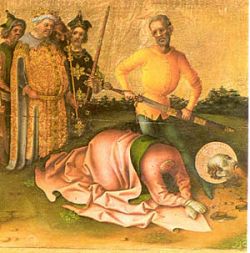 Martyred: 287
Martyred: 287Sts. Valerius and Rufinus have been well-known martyrs since the time of the early Church. They died in a town called Soissons, north of present-day Paris, towards the end of the third century. The two were part of a group of missionaries who were sent to evangelize that region. When the empire began persecuting Christians, they fled to a cave in a nearby forest. They were found, however, arrested, and brought to trial. When they made a bold profession of faith, they were beaten, tortured, and beheaded. The relics of St. Valerius rest in the reliquary chapel in the Basilica, and St. Rufinus is one of the 140 saints that are depicted in statues that stand atop the colonnade in front of St. Peter's Basilica in Rome. Prayer to the Holy Martyrs..... Glorious champions of Jesus Christ, who have fought the battle of martyrdom and have exchanged this bitter struggle for the peace of the angels in heaven, turn your eyes on me, a poor creature beset on all sides by spiritual dangers. Amid these troubles, I call to mind your great renown. You saints who overcame bodily torment to take heaven by storm, who vanquished the pleasures of the world and who set your eyes on heaven, look with affection on me. Add to the glory of your triumph by your intercession with God, so that I too may gain victory over the corruption of this world and its empty pomp. Blessed warriors, what comfort, what inspiration and joy it is for us to praise you and to follow in your footsteps. Your names and memories are held sacred. You who are true champions of God hasten to help me in my weakness. Give me strength to reach the heavenly kingdom where I may rejoice with you forever. Amen. St. Valerius & Rufinus, pray for us!  Born: 1919 in Brazil
Born: 1919 in BrazilDied: June 15, 1931 At age 12 Albertina was attacked by one of her father's employees, who tried to rape her, but she fought back. When the attacker realized he would fail and that she would identify him, he decided to kill her by stabbing her in the heart with a pen knife. Shortly after she died, people began speaking of graces received through Albertina's intercession. She was buried in the cemetery at Sao Luis, but due to the fame of her martyrdom and the favors obtained through her intercession, her body was later placed in the Church of Sao Luis. Albertina was beatified in 2007 by Pope Benedict XVI and is considered a martyr in defense of chastity. PRAYER TO BLESSED ALBERTINA BERKENBROCK.... God, Father of us all! You gave us your Son Jesus, who shed his blood on the cross for love of each one of us. Your servant Albertina was declared blessed by the Church, because as a young woman, she also shed her blood to be faithful to your will and defend life in its fullness. Grant us that, by her testimony, we become strong in faith, love and hope. Help us to live faithfully the commitments of our Baptism, as we partake in the Eucharist, the source and summit of our Christian life. Inspire us to continually seek forgiveness through Confession, filled with the holy Spirit at Confirmation, and cultivate the values of the gospel. Through the intercession of Albertina, obtain for us the grace that we now beg of you, the grace that you want to give us. We ask this Jesus Christ, your Son in the unity of the holy Spirit, as it was in the beginning, is now and will be forever. Amen. Blessed Albertina, pray for us! 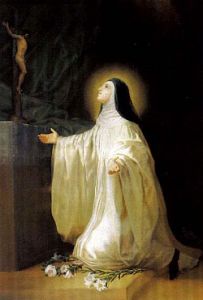 Born: 1182 - Tongres in the Netherlands
Born: 1182 - Tongres in the NetherlandsDied: June 16, 1246 at Aywieres, Belgium At the age of twelve Lutgardis was placed in the Benedictine convent of St. Catherine near Saint-Trond. Originally she felt no inclination whatsoever toward the religious life, but one day she had a vision of Christ that changed her outlook. At the age of twenty, Lutgardis entered the Benedictines. For more than a decade she experienced ecstacies during which she had visions of our Lord and our Blessed Mother. Lutgardis later went to a Cistercian convent at Aywieres, where she spent the final thirty years of her life and became reknowned as a mystic with the gifts of healing and prophecy. She died on June 16, 1246, having suffered blindness the last eleven years of her life. Although not all are called to the degree of mystical union that St. Lutgardis experienced, nonetheless, God's invitation to intimate union is universal. Our openness to God working in our lives, no matter who we are, is the first step down the road of perfect union with Him. St. Lutgardis, pray for us!  Polish, Franciscan Tertiary. 1845-1916
Polish, Franciscan Tertiary. 1845-1916 Canonized by Pope John Paul II in 1989. Born to a wealthy aristocratic family, Albert initially studied agriculture in order to manage the family estate. Involved in politics from his youth, he lost a leg at age 17 when injured while fighting in an insurrection. In Krakow, he became a popular, well-known and well-liked artist. Albert's interest in politics and art made him keenly aware of the human misery around him. A gentle and compassionate soul, he felt called to help those in need. After years of reflection, he understood that this desire was how God was calling him to service and Himself. Albert abandoned painting, and began a life of working with and for the poorest of Krakow. In 1887 he founded the Brothers of the Third Order of Saint Francis, Servants of the Poor, known as the Albertines or the Gray Brothers (after their rough gray habits ). In 1891 he founded the women's congregation of the Order (Gray Sisters). The Albertines organized food and shelter for the poor and homeless. Albert preached that the great calamity of our time was that so many refused to see and voluntarily relieve the suffering of their miserable brothers and sisters. The "haves" lived away from the "have-nots" in order to ignore them and leave their care to others. In 1949, Pope John Paul II wrote a well-received play about Albert; the work was filmed in 1997, released as "Our God's Brother". Prayer..... St. Albert, you persevered until you understood and answered God's call. Please intercede for us, and help us to understand and answer our call. Remind us also to serve Jesus through one another. Amen St. Albert, pray for us!  Belgian.
Belgian.Died a martyr: 640 Alena was born near Brussels, Belgium, into a pagan family. She became a Christian in secret. One night her father had sent guards to follow her. When they saw her enter a chapel for secret Mass with the Holy Eucharist, she was arrested and martyred. Miracles were connected with her death. When her parents witnessed these miracles, they became Christian. A chapel in Forest, Belgium, a municipality of Brussels, holds her relics and is a popular pilgrimage site. Prayer......... God of all creation, you gave Alena the privilege of being counted among the saints who gave their lives in faithful witness to the gospel. May her prayers give us the courage to share with her the cup of suffering and to rise to eternal glory. We ask this through our Lord Jesus Christ, your Son, who lives and reigns with you and the Holy Spirit, one God, for ever and ever. St. Alena, pray for us!  Italian. 1270-1340
Italian. 1270-1340Saint Juliana Falconieri was born in 1270 in answer to prayer. Her father was the builder of the splendid church of the Annunziata in Florence, while her uncle, Saint Alexis Falconieri, became one of the seven Founders of the Servite Order. Under his surveillance Juliana grew up "more like an angel than a human being," as he said. Her great modesty was remarkable. Her devotion to the sorrows of Our Lady drew her to the Servants of Mary or Servite Order. At the age of fourteen, after refusing an offer of marriage, she received the habit from Saint Philip Benizi, General of the Order. Her sanctity attracted many novices, for whose direction she was bidden to draw up a rule, and thus she became foundress of the Mantellate. She was the servant of her Sisters rather than their mistress. While outside her convent she led a life of apostolic charity, converting sinners, reconciling enemies, and healing the sick. She was sometimes rapt for whole days in ecstasy, and her prayers saved the Servite Order when it was in danger of being suppressed. In her old age Saint Juliana suffered various painful illnesses. She was wasting away through a disease of the stomach which prevented her taking food, and bore her silent agony with constant cheerfulness, grieving only for the privation of Holy Communion. At age 70 she was at the point of death, and she begged to be allowed once more to see and adore the Blessed Sacrament. It was brought to her cell and reverently laid on a corporal, which was placed over her heart. Saint Juliana died in her convent in Florence in 1340. Miracles have been frequently effected through her intercession. Prayer.... O faithful bride of Jesus and humble servant of Mary, Saint Juliana, who by practicing the most heroic virtues, especially the virtue of penance and the love of Jesus in His Sacrament, did arrive at the highest peak of Christian perfection and did merit to be fed miraculously with the Bread of Angels while in agony; obtain for me the grace to live a holy life in the exercise of every Christian duty and to be able to receive at the moment of death the comfort of the holy Sacraments in order to come with you to the blessed happiness of heaven. Amen. St. Juliana Falconieri, pray for us!  Beatified By: September 27, 1992 by Pope John Paul II
Beatified By: September 27, 1992 by Pope John Paul IIIrish Catholic Martyrs were people who have been sanctified in varying degrees for dying for their Roman Catholic faith between 1537 and 1714 in Ireland. The seventeen Irish Martyrs are: Bishop Patrick O' Healy Fr. Conn O'Rourke Margaret Bermingham Dr. Dermot O'Hurley Fr. Maurice MacKenraghty Dominic Collins Bishop Cornelius O'Devany Fr. Patrick O'Loughran Francis Taylor Fr. Peter Higgins Bishop Terence Albert O'Brien Fr. John Kearney Fr. William Tirry Matthew Lambert Robert Myler Edward Cheevers Patrick Cavanagh. "But the souls of the righteous are in the hand of God, and no torment will ever touch them. In the eyes of the foolish they seemed to have died, and their departure was thought to be an affliction, and their going from us to be their destruction; but they are at peace." Wisdom 3:1-3 Holy Martyrs of Ireland, pray for us!  Italian. 1568-1591
Italian. 1568-1591St. Aloysius was born in Castiglione, Italy. He was destined for the military by his father (who was in service to Philip II), but by the age of 9 Aloysius had decided on a religious life. St. Charles Borromeo gave him his first Holy Communion. A kidney disease prevented St. Aloysius from a full social life for a while, so he spent his time in prayer and reading the lives of the saints. Although he was appointed a page in Spain, St. Aloysius kept up his many devotions and austerities, and was quite resolved to become a Jesuit. His family eventually moved back to Italy, where he taught catechism to the poor. When he was 18, he joined the Jesuits, after finally breaking down his father, who had refused his entrance into the order. He served in a hospital during the plague of 1587 in Milan, and died from it at the age of 23, after receiving the last rites from St. Robert Bellarmine. The last word he spoke was the Holy Name of Jesus. St. Robert wrote the Life of St. Aloysius. Prayer.... O Holy Mary! My Mother; into thy blessed trust and special custody, and into the bosom of thy mercy, I this day, and every day, and in the hour of my death, commend my soul and body. To thee I commit all my anxieties and sorrows, my life and the end of my life, that by they most holy intercession, and by thy merits, all my actions may be directed and governed by thy will and that of thy Son. Amen. - St. Aloysius Gonzaga St. Aloysius Gonzaga, pray for us! 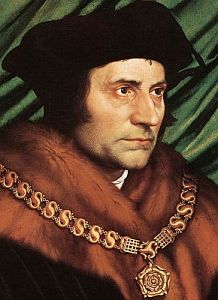 Born 1478, London, England
Born 1478, London, EnglandBeheaded 1535 on Tower Hill, London, England After a thorough grounding in religion and the classics, he entered Oxford to study law. Upon leaving the university he embarked on a legal career which took him to Parliament. In 1505, he married his beloved Jane Colt who bore him four children, and when she died at a young age, he married a widow, Alice Middleton, to be a mother for his young children. A wit and a reformer, this learned man numbered Bishops and scholars among his friends, and by 1516 wrote his world-famous book "Utopia". He attracted the attention of Henry VIII who appointed him to a succession of high posts and missions, and finally made him Lord Chancellor in 1529. However, he resigned in 1532, at the height of his career and reputation, when Henry persisted in holding his own opinions regarding marriage and the supremacy of the Pope. The rest of his life was spent in writing mostly in defense of the Church. In 1534, with his close friend, St. John Fisher, he refused to render allegiance to the King as the Head of the Church of England and was confined to the Tower. Fifteen months later, and nine days after St. John Fisher's execution, he was tried and convicted of treason. He told the court that he could not go against his conscience and wished his judges that "we may yet hereafter in heaven merrily all meet together to everlasting salvation." And on the scaffold, he told the crowd of spectators that he was dying as "the King's good servant-but God's first." "Although I know well, Margaret, that because of my past wickedness I deserve to be abandoned by God, I cannot but trust in his merciful goodness. His grace has strengthened me until now and made me content to lose goods, land, and life as well, rather than to swear against my conscience. God's grace has given the king a gracious frame of mind toward me, so that as yet he has taken from me nothing but my liberty. In doing this His Majesty has done me such great good with respect to spiritual profit that I trust that among all the great benefits he has heaped so abundantly upon me, I count my imprisonment the very greatest. I cannot, therefore, mistrust the grace of God. By the merits of his bitter passion joined to mine and far surpassing in merit for me all that I can suffer myself, his bounteous goodness shall release me from the pains of purgatory and shall increase my reward in heaven besides. I will not mistrust him, Meg, though I shall feel myself weakening and on the verge of being overcome with fear. I shall remember how Saint Peter at a blast of wind began to sink because of his lack of faith, and I shall do as he did: call upon Christ and pray to him for help. And then I trust he shall place his holy hand on me and in the stormy seas hold me up from drowning. And finally, Margaret, I know this well: that without my fault he will not let me be lost. I shall, therefore, with good hope commit myself wholly to him. And if he permits me to perish for my faults, then I shall serve as praise for his justice. But in good faith, Meg, I trust that his tender pity shall keep my poor soul safe and make me commend his mercy. And, therefore, my own good daughter, do not let your mind be troubled over anything that shall happen to me in this world. Nothing can come but what God wills. And I am very sure that whatever that be, however bad it may seem, it shall indeed be the best." - from a letter written by Saint Thomas More from prison to his daughter Margaret St. Thomas More, pray for us!  Italian. 1811-1860
Italian. 1811-1860Joseph Cafasso was born at Castelnuovo d'Asti in the Piedmont, Italy, of peasant parents. He studied at the seminary at Turin, and was ordained in 1833. He continued his theological studies at the seminary and university at Turin and then at the Institute of St. Franics, and despite a deformed spine, became a brilliant lecturer in moral theology there. He was a popular teacher, actively opposed Jansenism, and fought state intrusion into Church affairs. He succeeded Luigi Guala as rector of the Institute in 1848 and made a deep impression on his young priest students with his holiness and insistence on discipline and high standards. He was a sought-after confessor and spiritual adviser, and ministered to prisoners, working to improve their terrible conditions. He met Don Bosco in 1827 and the two became close friends. It was through Joseph's encouragement that Bosco decided his vocation was working with boys. Joseph was his adviser, worked closely with him in his foundations, and convinced others to fund and found religious institutes and charitable organizations. Joseph died on June 23 at Turin and was canonized in 1947. "We are born to love, we live to love, and we will die to love still more." -Saint Joseph Cafasso "A single word from him - a look, a smile, his very presence - sufficed to dispel melancholy, drive away temptation and produce holy resolution in the soul." - St. John Bosco, writing about Saint Joseph St. Joseph Cafasso, pray for us!  Today we celebrate and bear witness to the unfolding of the creation's renewal now affirmed in the birth of John the Baptist. Previously bound to death, the creation begins to reflect its true identity. From the barrenness of Elizabeth emerges the forerunner of the one who is life.
Today we celebrate and bear witness to the unfolding of the creation's renewal now affirmed in the birth of John the Baptist. Previously bound to death, the creation begins to reflect its true identity. From the barrenness of Elizabeth emerges the forerunner of the one who is life.Celebrating the nativity of St. John should be an expression of our thanks to God who has delivered us from the horrible barrenness of death, which not only robs us of our biological existence but strives to impair and ultimately smother the creative powers of the mind and heart. Consequently, human creativity, now imbued with hope and life, is urged on by divine love to transcend its inherent limitations. Finding its highest expression in true worship human creativity is joined to divine life. The human person and his unique energy gradually, through ascetic effort, achieves harmony with the divine energy and hence the unfolding of the eternal ascent into the kingdom which is to come. As members of the body of Christ, we are endowed with a prophetic calling. We are to proclaim and to show that the barrenness of creation has been filled with life. In the midst of desolation, God has brought John, the greatest of prophets, to prepare the way of the Lord. Like St. John, we are to continue announcing the prophetic word which awakens the creation from the barren slumber of sin. Like St. John, we are commissioned to lead an anxious and searching humanity to repentance by which it is drawn into the embrace of the Life Giver. St. John prepared Israel for the coming of the Messiah. His call to repentance and baptism formed a faithful remnant that awaited the coming of the Messiah. It was this remnant that helped to provide the human component of the Church. Now we are responsible for continuing the call to repentance, which leads to the baptism of water and the Spirit. This is the baptism that enables humanity to become one with the sacred Passover which takes us from death to life. This is the baptism that compels us to prophesy the Lord's glorious second coming. The feast of the Baptist's birth affirms the victory of regenerated and transfigured life. New life emerging from the barrenness of sin and death is the joyous core of our feast. Here is the beginning and end of the Church's mission to and for the world. Amen. St. John the Baptist, pray for us!  Born 1765 in Cordoba, Spain
Born 1765 in Cordoba, SpainDied as a Martyr (beheaded) in June 25, 1838 in Nam Dinh, Vietnam (one of the Martyrs of Vietnam) Dominican priest, ordained, September 18, 1790. Co-adjutor vicar apostolic, with St. Ignatius Delgado, of Eastern Tonkin, Vietnam on September 9, 1800 and titular bishop. Arrested with St. Francis Chieu at the beginning of the government persecutions of Christian missionaries. Martyrs of Vietnam Prayer..... O Vietnamese Martyrs, with the Grace of God, you had victoriously implanted the mustard seed of Faith that grew into the Church of Vietnam. Your courageous sacrifice had reserved your Heavenly rest. United with you, we offer our gratitude and thanks to God and the Holy Mother, for all of your martyrdom and your lives that we now celebrate. We beseech you, to follow your Faith in humility, charity and love. When we are in despair and danger, please aid and console us in fulfilling the Father's Will and carry our crosses to Eternal Glory. Amen. Martyrs of Vietnam, pray for us!  Martyred in 1794.
Martyred in 1794.Martyred Sisters of Charity of St. Vincent de Paul. Mary Magdalene was superior of the congregation's house at Arras when the French Revolution erupted in the country. With three members of her community, Mary Magdalene was guillotined at Cambrai, France. She was beatified in 1920. Blessed Marie Magdalene Fontaine & Companions, pray for us!  Born: 376, Alexandria, Egypt
Born: 376, Alexandria, EgyptDied: 444. Bishop and Doctor of the Church Nephew of Theophilus the Patriarch. Monk. Priest. Bishop of Alexandria, Egypt in 412. Patriarch of Alexandria. Worked at the Council of Ephesus. Fought against Nestorius who taught the heresy that there were two persons in Christ. Catechetical writer. "By nature, each one of us is enclosed in his own personality, but supernaturally, we are all one. We are made one body in Christ, because we are nourished by one flesh. As Christ is indivisible, we are all one in him. Therefore, He asked His Father "that they may all be One as We also are one." - Saint Cyril of Alexandria Prayer in Honor of Mary, the Mother of God....by St. Cyril of Alexandria... Hail, Mary, Mother of God, venerable treasure of the whole universe, lamp that is never extinguished, crown of virginity, support of the true faith, indestructible temple, dwelling of him whom no place can contain, O Mother and Virgin! Through you all the holy Gospels call blessed the one whom comes in the name of the Lord. Hail, Mother of God. You enclosed under your heart the infinite God whom no space can contain. Through you the Most Holy Trinity is adored and glorified, the priceless cross is venerated throughout the universe. Through you the heavens rejoice, and the angels and archangels are filled with gladness. Through you the demons are banished, and the tempter fell from heaven. Through you the fallen human race is admitted to heaven. Hail, Mother of God. Through you kings rule, and the only-begotten Son of God has become a star of light to those who were sitting in darkness and in the shadow of death. Amen. St. Cyril of Alexandria, pray for us! 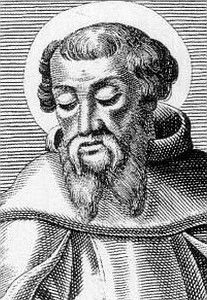 Born: 130 in Smyrna, Asia Minor
Born: 130 in Smyrna, Asia Minor (modern Izmir, Turkey) Martyred: 202 in Lyons, France. Father of the Church. Disciple of St. Polycarp. "It is not you that shapes God, it is God that shapes you. If you are the work of God, await the hand of the artist who does all things in due season. Offer Him your heart, soft and tractable, and keep the form in which the artist has fashioned you. Let your clay be moist, lest you grow hard and lose the imprint of his fingers." - attributed to St. Irenaeus St. Irenaeus, pray for us! 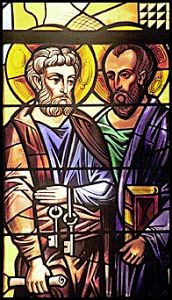 Veneration of the two great Apostles, Peter and Paul, has its roots in the very foundations of the Church. They are the solid rock on which the Church is built. They are at the origin of her faith and will forever remain her protectors and her guides. To them Rome owes her true greatness, for it was under God's providential guidance that they were led to make the capital of the Empire, sanctified by their martyrdom, the center of the Christian world whence should radiate the preaching of the Gospel.
Veneration of the two great Apostles, Peter and Paul, has its roots in the very foundations of the Church. They are the solid rock on which the Church is built. They are at the origin of her faith and will forever remain her protectors and her guides. To them Rome owes her true greatness, for it was under God's providential guidance that they were led to make the capital of the Empire, sanctified by their martyrdom, the center of the Christian world whence should radiate the preaching of the Gospel.St. Peter suffered martyrdom under Nero, in A.D. 66 or 67. He was buried on the hill of the Vatican where recent excavations have revealed his tomb on the very site of the basilica of St. Peter's. St. Paul was beheaded in the via Ostia on the spot where now stands the basilica bearing his name. Down the centuries Christian people in their thousands have gone on pilgrimage to the tombs of these Apostles. In the second and third centuries the Roman Church already stood pre-eminent by reason of her apostolicity, the infallible truth of her teaching and her two great figures, Sts. Peter and Paul. Almighty God, whose blessed apostles Peter and Paul glorified you in their death as in their life: grant that your Church, inspired by their teaching and example, and made one by your Spirit, may ever stand firm upon the one foundation, Jesus Christ your Son our Lord, who is alive and reigns with you, in the unity of the Holy Spirit, one God, now and for ever. Amen. Sts. Peter & Paul, pray for us! 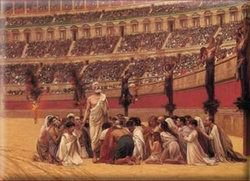 The first Christian Martyrs of Rome were all disciples of the Apostles. They were blamed by the Roman Emperor Nero with setting fire to Rome, Italy, and were sentenced to death as punishment. The total number of these murders is known only to God.
The first Christian Martyrs of Rome were all disciples of the Apostles. They were blamed by the Roman Emperor Nero with setting fire to Rome, Italy, and were sentenced to death as punishment. The total number of these murders is known only to God. In the year 64, they were martyred in a variety of ways, the gorier the better from Nero's point of view; some were covered with the skins of animals and thrown to wild dogs to be torn apart; others were crucified and at sunset were covered in oil and used as human torches Prayer.... Father, you sanctified the Church of Rome with the blood of its first martyrs. May we find strength from their courage and rejoice in their triumph. We ask this through our Lord Jesus Christ, your Son, who lives and reigns with you and the Holy Spirit, one God, for ever and ever. Amen. Holy Martyrs of Rome, pray for us! |




